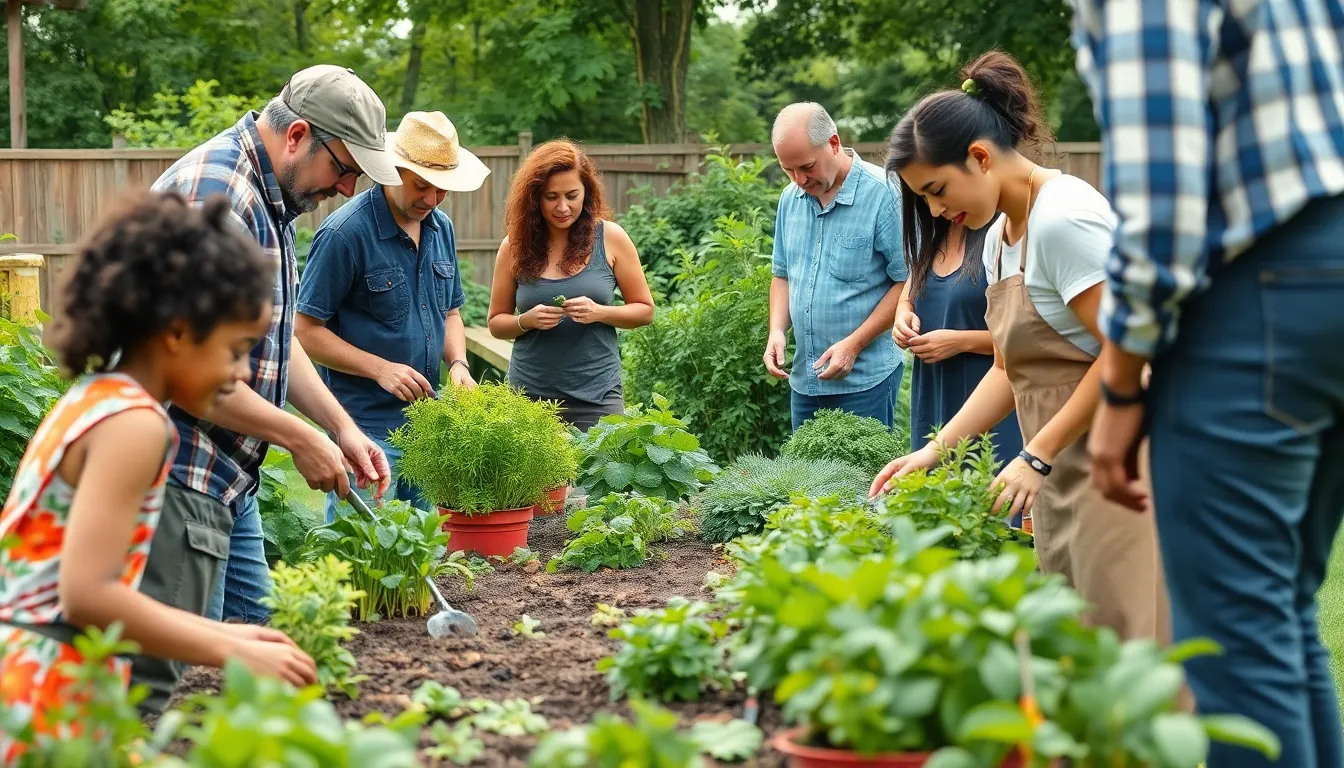In a world where plastic seems to outnumber people, sustainability resources are like the superhero sidekicks we never knew we needed. They swoop in to save the day, offering tools and tips to help everyone tread lightly on this beautiful planet. With climate change knocking at our door, it’s time to roll up those sleeves and dive into the treasure trove of sustainable practices that can make a real difference.
From eco-friendly DIY projects to energy-saving hacks that even your grandma would approve of, these resources make going green feel less like a chore and more like a fun adventure. So grab your reusable bags and let’s explore the vibrant world of sustainability—where every small change counts and saving the Earth can be as easy as pie (or should we say, as easy as composting?).
Table of Contents
ToggleOverview of Sustainability Resources
Sustainability resources play a crucial role in promoting eco-friendly practices. These resources include a wide range of tools that facilitate a greener lifestyle. For example, DIY project guides empower individuals to create sustainable products from everyday materials. Furthermore, energy-saving tips help households lower utility bills while reducing their carbon footprint.
Many organizations provide online platforms. These platforms offer educational materials and actionable strategies for sustainable living. Websites like EcoWatch and the World Wildlife Fund feature articles, infographics, and toolkits. Such resources guide users on everything from waste reduction to sustainable gardening.
Local governments often support sustainability efforts through community programs. Some initiatives focus on recycling and composting to minimize landfill waste. Others promote urban greenery, encouraging residents to plant trees and create gardens. Engaging in these activities fosters a sense of community and shared responsibility.
Social media also serves as a powerful tool for sharing sustainability resources. Platforms like Instagram and Pinterest showcase creative eco-friendly projects and tips. Users can follow sustainable influencers for inspiration and innovative ideas.
Education plays an integral part in developing a sustainable mindset. Schools often incorporate environmental studies into their curriculums. Workshops and seminars on sustainability provide valuable knowledge to attendees of all ages.
Sustainability resources encompass a diverse array of tools and information. Utilizing these resources can simplify the adoption of eco-friendly habits. Embracing sustainability not only benefits the environment but enhances overall quality of life. Through collaboration, education, and innovation, individuals and communities can make meaningful contributions toward a sustainable future.
Types of Sustainability Resources

Sustainability resources come in various forms, tailored to address different aspects of environmental conservation. These resources support eco-friendly practices, encouraging individuals and communities to engage in sustainable living.
Renewable Energy Resources
Renewable energy resources include solar, wind, and hydropower. Solar energy systems like photovoltaic panels harness sunlight to produce electricity. Wind turbines convert the kinetic energy of wind into power, while hydropower utilizes flowing water. Each of these options contributes to reducing reliance on fossil fuels. Various organizations provide guidance on implementing these technologies, allowing individuals to opt for cleaner energy sources. Community solar programs enable groups to share renewable energy projects, enhancing accessibility and collective impact.
Water Conservation Resources
Water conservation resources focus on methods that reduce water usage and waste. Simple practices like rainwater harvesting and xeriscaping promote resource efficiency. Organizations such as the Environmental Protection Agency offer guidelines and tools for efficient water management. Education on low-flow fixtures and irrigation techniques empowers individuals to make informed decisions. Local workshops often provide hands-on experience in adopting these practices. Multiplier effects from water conservation lead not only to reduced bills but also to improved ecosystem health.
Sustainable Agriculture Resources
Sustainable agriculture resources emphasize eco-friendly farming methods. Practices such as crop rotation, permaculture, and organic farming enhance soil health. Educational platforms provide detailed information on these methods, promoting biodiversity and reduced chemical use. Local universities often conduct research on sustainable practices, sharing findings with farmers. Community-supported agriculture programs connect consumers with local farmers, fostering direct relationships. These resources help shift agricultural practices toward sustainability, benefiting both producers and consumers.
Accessing Sustainability Resources
Accessing sustainability resources enhances eco-friendly living. Organizations and initiatives provide valuable insights and actionable strategies.
Online Platforms and Tools
Online platforms offer a wealth of information. EcoWatch provides articles and guides on environmental issues, making sustainable practices accessible for everyone. The World Wildlife Fund hosts educational materials that inform users about biodiversity and climate change. Tools, such as carbon footprint calculators, help individuals assess their environmental impact. Numerous apps on the market track energy consumption or guide sustainable shopping choices. By utilizing these resources, individuals can make informed decisions that contribute to sustainability.
Community Programs and Initiatives
Community programs play a vital role in promoting sustainability. Local governments often host workshops that teach water-saving techniques, energy efficiency practices, and recycling best practices. Initiatives like community gardens encourage residents to grow their own food and foster a sense of belonging. Many neighborhoods have sustainability-focused groups that share resources and organize events. Taking part in these initiatives empowers individuals to make meaningful contributions. Collaboration within communities cultivates a shared commitment to environmental stewardship.
Benefits of Utilizing Sustainability Resources
Utilizing sustainability resources offers numerous advantages that enhance environmental outcomes. Access to educational materials empowers individuals to make informed choices, driving more eco-friendly practices. Practical tools, such as carbon footprint calculators, help assess personal environmental impacts, fostering awareness and encouraging action.
Opportunities for community engagement arise through local programs and initiatives. These initiatives foster a collaborative spirit, uniting individuals in shared environmental goals. Workshops on topics like water conservation and energy efficiency often result from local government efforts, promoting actionable strategies within the community.
Economic benefits frequently accompany sustainable practices. Incorporating renewable energy sources, such as solar or wind, can lead to reduced utility bills over time. Many individuals experience significant savings while contributing to the reduction of greenhouse gas emissions.
Health improvements form another crucial advantage of utilizing sustainability resources. Organic agriculture promotes healthier food options, reducing exposure to harmful pesticides. Moreover, greener spaces, such as community gardens, enhance the quality of local environments, fostering a sense of well-being.
Flexibility in improving lifestyle choices arises from a variety of resources designed to meet diverse needs. Online platforms, such as EcoWatch, provide a wealth of information about environmental issues and practices. Many individuals find inspiration and guidance from these resources, making sustainable living both achievable and enjoyable.
Sustainability resources lead to a more profound understanding of environmental issues. Educational programs integrated into school curriculums expose students to the concepts of sustainability at an early age. These early lessons cultivate a generation that values and prioritizes environmental stewardship.
Embracing sustainability resources opens doors to a greener future. By tapping into various tools and platforms individuals can make impactful choices that benefit both the environment and their communities. The journey toward sustainable living is not only achievable but also rewarding.
With the right resources and a commitment to education, everyone can contribute to a healthier planet. Small changes lead to significant outcomes and foster a sense of community. As more people engage with sustainability initiatives the collective effort will drive meaningful progress.
Together they can create a sustainable legacy for future generations.



